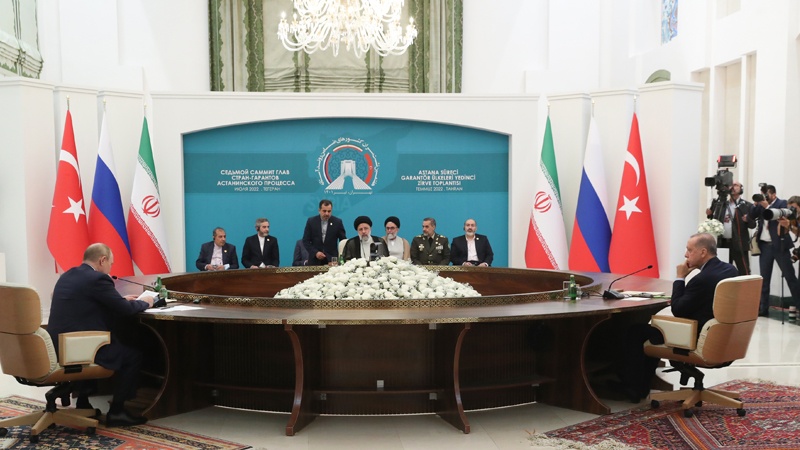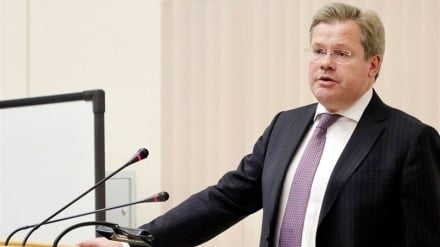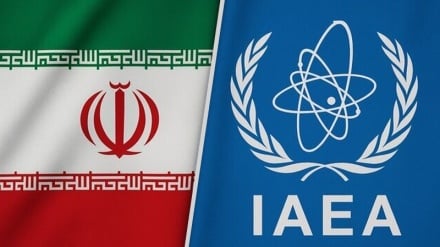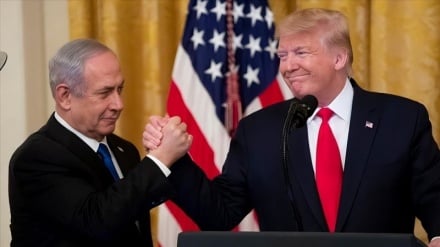Iran, Russia, Turkey hold trilateral Astana format summit in Tehran
Iran, Russia, and Turkey have held a Tripartite Summit on the Syria peace process that seeks to work towards ending more than 11 years of conflict in the West Asian country.
According to the reports, the leaders of the three countries, as the guarantors of the “Astana peace process” concerning Syria, took part in the the seventh edition of the conference hosted by Tehran on Tuesday.
Addressing the event, President Seyyed Ebrahim Raeisi said the Astana format had, as a “successful framework” meant for peaceful resolution of Syria’s crisis, obtained some “good achievements.”
“The responsibility for its [the framework’s] preservation and development rests primarily on us, friendly countries, as its guarantors,” Raeisi said.
Underlining the importance of preservation of Syria’s integrity, territorial sovereignty, and independence, the president insisted that the fate of the West Asian country had to be decided by its own people and through intra-Syrian negotiations in the absence of all foreign interference.
“With the passage of 11 years since the onset of crisis in Syria, the Islamic Republic still believes that the only means of the crisis’ resolution to be [through] political [means],” Raeisi said.
“Military solution only exacerbates the [current] situation,” he added, noting violation of Syria’s territorial integrity has not contributed to the regional security, and calling the Arab country’s sovereignty “an inviolate principle.”
The president also said Tehran, Moscow and Ankara have, since the past and based on the agreements, supported political resolution of the crisis, including through holding of a referendum on the Syrian constitution, and laid emphasis on our resolve to fight terrorism throughout the region, including in Syria.
“The determination of the countries that form the Astana process rests in advancement of previous agreements,” he asserted.
Raeisi reminded the sacrifices that had been made towards the fight against terrorism, commemorating the memory of those who had lost their lives down this path, most notably Lieutenant General Qassem Soleimani who was martyred by the US in Iraq.
He also denounced the US’s unilateral sanctions for “compounding the pressure on the Syrian people.” The Islamic Republic condemns all sanctions targeting the world’s nations, and would “continue its instances of support for the Syrian people more powerfully [than before],” he stated.
The Islamic Republic condemns all sanctions targeting the world’s nations, and would “continue its instances of support for the Syrian people more powerfully [than before],” he stated.
Putin: West plundering Syria wealth to take country apart
The Russian president also addressed the event, condemning the West for plundering Syria’s natural wealth with the intention of disintegrating the country.
Putin also called on the UN to provide humanitarian aid to Damascus without any preconditions.
Concerning advancement of a political solution to Syria’s crisis, he said, “Good steps must be taken in order to help inclusive dialog so that the Syrians would be able to determine their fate without external interference.”
Concluding his remarks, the Russian head of state considered the seventh summit to have been fruitful.
Meanwhile, Erdogan also called the Astana process the only platform that had taken necessary measures for peace in Syria.
“We are all like-minded concerning [the fact] that the Syrian crisis can only be resolved through political solutions,” he added.
The summit ended by issuance of a final statement, through which, the Astana process’s guarantor states likewise insisted that there were no military solutions to the Syrian conflict, and underlined their resolve to continue their cooperation in the fight against terrorism in all its forms and manifestations.
The text of the final statement of the Tehran summit is as follows:
Joint Statement by the President of the Islamic Republic of Iran, the President of the Russian Federation, and the President of the Republic of Turkey, Tehran, 19 July 2022.
The Presidents:
1. Discussed the current situation on the ground in Syria, reviewed the developments following the last virtual summit on 1 July 2020, and reiterated their determination to enhance the trilateral coordination in light of their agreements as well as the conclusions of foreign ministers and representatives’ meetings. Also, examined the latest international and regional developments and emphasized the leading role of the Astana Process in the peaceful and sustainable settlement of the Syrian crisis;
2. Emphasized their unwavering commitment to the sovereignty, independence, unity, and territorial integrity of the Syrian Arab Republic as well as to the purposes and principles of the UN Charter. Highlighted that these principles should be universally respected and that no actions, no matter by whom they were undertaken should undermine them;
3. Expressed their determination to continue working together to combat terrorism in all forms and manifestations. Condemned increased presence and activities of terrorist groups and their affiliates under different names in various parts of Syria, including the attacks targeting civilian facilities, which result in loss of innocent lives. Highlighted the necessity to fully implement all arrangements related to the north of Syria;
4. Rejected all attempts to create new realities on the ground under the pretext of combating terrorism, including illegitimate self-rule initiatives, and expressed their determination to stand against separatist agendas aimed at undermining the sovereignty and territorial integrity of Syria as well as threatening the national security of neighboring countries including through cross-border attacks and infiltrations;
5. Discussed the situation in the north of Syria, emphasized that security and stability in this region can only be achieved on the basis of preservation of the sovereignty and territorial integrity of the country, and decided to coordinate their efforts to this end. Expressed their opposition to the illegal seizure and transfer of oil revenues that should belong to Syria;
6. Reaffirmed the determination to continue their ongoing cooperation in order to ultimately eliminate terrorist individuals, groups, undertakings, and entities, while ensuring the protection of the civilians and civilian infrastructure in accordance with international humanitarian law;
7. Reviewed in detail the situation in the Idlib de-escalation area and underscored the necessity to maintain calm on the ground by fully implementing all agreements on Idlib. Expressed their serious concern over the presence and activities of terrorist groups that pose threat to civilians inside and outside the Idlib de-escalation area. Agreed to make further efforts to ensure sustainable normalization of the situation in and around the Idlib de-escalation area, including the humanitarian situation;
8. Expressed grave concern at the humanitarian situation in Syria and rejected all unilateral sanctions which are in contravention of international law, international humanitarian law, and the UN Charter including, among other things, any discriminatory measures through waivers for certain regions which could lead to this country’s disintegration by assisting separatist agendas. In this regard, called upon the international community, particularly the UN and its humanitarian agencies and other governmental/non-governmental international institutions to increase their assistance to all Syrians without discrimination, politicization, and preconditions and in a more transparent manner;
9. Reaffirmed their conviction that there could be no military solution to the Syrian conflict and that it could only be resolved through the Syrian-led and Syrian-owned, UN-facilitated political process in line with the UN Security Council Resolution 2254. Emphasized in this regard the important role of the Constitutional Committee, created as a result of the decisive contribution of the Astana guarantors and the implementation of the decisions of the Syrian National Dialogue Congress in Sochi. Reaffirmed the readiness to support the continuous interactions with its members and the UN Secretary-General’s Special Envoy for Syria Geir O. Pedersen as a facilitator, in order to ensure the sustainable and effective work of the next sessions of the Constitutional Committee. Expressed the conviction that the Committee in its work should respect the Terms of Reference and Core Rules of Procedure to enable the Committee to implement its mandate of preparing and drafting for popular approval a constitutional reform as well as achieving progress in its work and be governed by a sense of compromise and constructive engagement without foreign interference and externally imposed timelines aimed at reaching a general agreement of its members. Underlined the necessity that it should conduct its activities without any bureaucratic and logistical hindrances;
10. Reaffirmed their determination to continue operations on the mutual release of detainees/abductees within the framework of the respective Working Group of the Astana format. Underscored that the Working Group was a unique mechanism that had proved to be effective and necessary for building confidence between the Syrian parties, and decided to further continue its work on the release of detainees and abductees and expand its operations in line with its mandate on the handover of bodies and identifications of missing persons;
11. Highlighted the need to facilitate the safe and voluntary return of refugees and internally displaced persons (IDPs) to their original places of residence in Syria, ensuring their right to return and the right to be supported. In this regard, they called upon the international community to provide appropriate contributions for their resettlement and normal life as well as to undertake greater responsibility in burden-sharing and to enhance their assistance to Syria, inter alia by developing early recovery projects, including basic infrastructure assets especially – water, electricity, sanitation, health, educations, schools, hospitals and etc as well as the humanitarian mine action in accordance with international humanitarian law;
12. Condemned the continuing Israeli military attacks in Syria including civilian infrastructures. Considered it as violating the international law, international humanitarian law, sovereignty, and territorial integrity of Syria, and recognized it as destabilizing and intensifying the tension in the region. Reaffirmed the necessity to abide by universally recognized international legal decisions, including those provisions of the relevant UN resolutions rejecting the occupation of the Syrian Golan, first and foremost UN Security Council Resolutions 242 and 497 which also consider all decisions and measures taken by Israel in this regard null and void and have no legal effect;
13. In addition to the Syrian issue, they confirmed their intention to strengthen trilateral coordination in different fields in order to promote joint political and economic cooperation;
14. Agreed to assign their representatives with the task of holding the 19th International Meeting on Syria in the Astana format by the end of 2022;
15. Decided to hold the next Tripartite Summit in the Russian Federation upon the invitation of President of the Russian Federation, H.E. Vladimir Putin;
16. The Presidents of the Russian Federation and the Republic of Turkey expressed their sincere gratitude to the President of the Islamic Republic of Iran Seyyed Ebrahim Raeisi for graciously hosting the Tripartite Summit within the framework of the Astana format in Tehran.
SS



